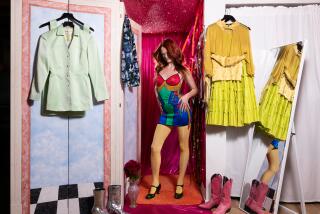Fashion Sensation Is Out of Work
- Share via
New York-based fashion designer Miguel Adrover, one of the latest style world darlings and known for clothes that reeked of social commentary, is out of business. On Friday, Leiber Group, which acquired Adrover in April 2000, announced plans to suspend operations while it seeks a partner or buyer.
The Spanish-born Adrover created a sensation two years ago when he sent a deconstructed Burberry trench coat down the runway in his spring 2000 show--only his second collection. The fashion press, always hungry for a new “it” designer, crowned the 30-something Adrover. He didn’t disappoint. Other pieces included a town coat made from a mattress tossed out by his neighbor, writer Quentin Crisp, and a backwards dress constructed from military shirts found at a secondhand Army-Navy store.
But there were more accessible styles, too, including last spring’s military, western, hip-hop and nautical looks. Earlier this year, his fall collection evoked traditional garb from North Africa and the Middle East. Still, accessibility and critical raves apparently weren’t enough to sustain the line, which has been sold in such upscale stores as Barneys New York and Neiman Marcus.
Part of Adrover’s downfall, said Simon Doonan, creative director of Barneys New York, was that he grew too far, too fast. “It takes many years for a designer to establish a clientele before they become viable,” said Doonan. “This shows that good press isn’t very important in the end; it’s whether the consumer is engaged in the product. He should have gotten a shop in the East Village and built his business. ... It was all too accelerated. I’m sure [Leiber Group] wanted to see a return on their investment, and for a new designer, it’s tempting to take those opportunities.”
Doonan said Barneys bought pieces of Adrover’s collection “judiciously” and considered him a talent worth nurturing. The clothes sold well to wealthy 40ish women who could afford the four-figure pieces. “His thought process is enormously sophisticated ... so sophisticated it wasn’t speaking to the consumer. It was speaking to people like me, and I worried that stores were not going to know how to hang his stuff.”
Friday’s announcement came in the form of a press release from Adrover and Susan Sokol, president and chief executive of Leiber Group. “My biggest concern at this moment is what’s in the best interests of the greatest team of people I could ever work with,” Adrover was quoted as saying. “While it’s not an easy time, I look forward to exploring new possibilities.”
Economic realities had taken a harsh toll on the fashion business, even before the terrorist attacks last month. Stores are experiencing a steep drop in sales and are bracing for a tough fall and winter, slashing budgets and, in some cases, canceling merchandise orders.
Despite politicans’ encouragements to consumers to spend, spend, spend, many are hanging on tightly to their wallets.
Leiber Group spokesman Jason Weisenfeld would not comment on potential buyers or partners. Leiber Group, formerly known as Pegasus Apparel Group, last year also scooped up designers Pamela Dennis, Daryl Kerrigan and handbag designers Angela Amiri as part of a corporate strategy to take lesser-known labels and build their profiles. (It also owns a majority stake in handbag designer Judith Leiber.) However, a year later, Dennis and Amiri had bought back licensing rights to their names, and production of Kerrigan’s fall line was suspended. At the time, Weisenfeld told The Times, “If we feel a business does not have the potential to achieve profitability, we need to make the appropriate modifications to the business plans.”
On Friday, Weisenfeld said, “We think Miguel is an incredibly talented designer, and he has shown incredible growth in a relatively short time.
Doonan agreed: “He’ll be fine because he’s talented. He’ll land on his feet somewhere, I wouldn’t worry about it.”






